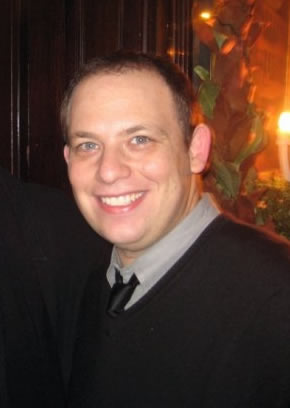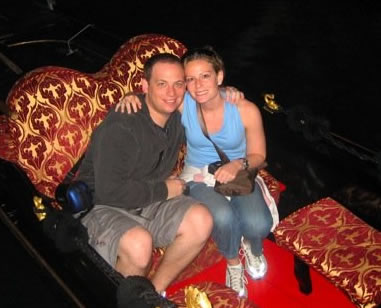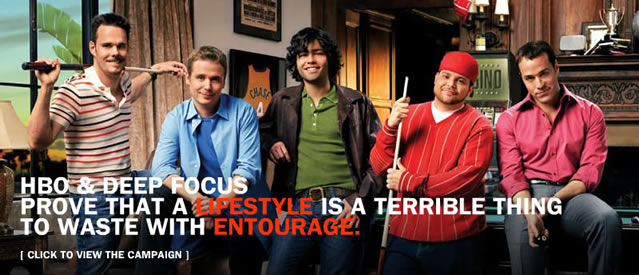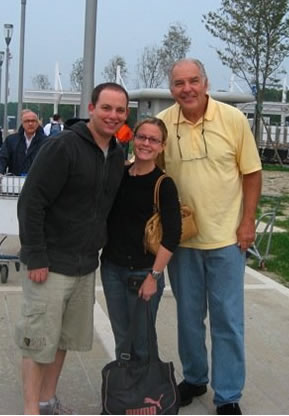
This interview is with Ian Schafer, the CEO and founder of a New York City based full-service interactive marketing agency called Deep Focus. Ian talks about how he got the first major paid video advertising on YouTube. He explains how he gets deals set up with companies like MySpace, and how it is to run the Internet advertising for HBO, including TV shows like the Sopranos and (my favourite!) Entourage. Ian also gives us insight into his hiring process and how he selects senior managers.
Full Interview Audio and Transcript
Personal Info
Hobbies and Interests: Video Games, Job, Sports.
Favourite Sports Teams: New York Mets, New York Giants, New York Rangers, New York Knicks.
Favourite Books:
- Everything Is Miscellaneous: The Power of the New Digital Disorder by David Weinberger
- Ogilvy on Advertising by David Ogilvy
- Books by Chuck Palahniuk
Personal Blog: http://www.ianschafer.com
Company Website: http://www.deep-focus.net
Fast Track Interview
Adrian Bye: Today I have the pleasure of talking with Ian Schafer, who is the CEO and founder of an agency called Deep Focus. Ian, tell us a little bit about who you are and what you do.
Ian Schafer: Deep Focus is almost six years old. We are a full-service interactive marketing agency. We have four core disciplines: media planning and buying, creative development, publicity, and consulting strategy. We look at things holistically, strategically, and with an integrated approach where advertising is not just thrusting a message upon the consumer but actually fostering a conversation.
I was raised in New Jersey. I grew up around entertainment, marketing, and market research. My father worked at ABC for about 15 years. He was Vice President of Market Research and left that position to run a company called Marketing Evaluations, which is responsible for Q Scores or celebrity and personality ratings. I went to George Washington University in Washington, DC from 1994 through 1996. I spent my summers programming Unix at AT&T where I was working on building the back end of one of the first major ad-supported Web sites for AT&T. I was also working on the alpha version of Net Gravity, which ultimately became DoubleClick.
At school, I started as an International Affairs Major. I realized that didn’t quite interest me. I switched my focus to Business and entered a five-year Masters Degree program in Information Systems Technology. When it was time to graduate with my undergrad degree, I saw what was developing with the Internet and realized the great potential for both myself and the industry. I decided to leave the Masters Degree program and get to work.
In 1997, I went to work at a start-up interactive shop called iTraffic, which was one of the first media-buying agencies. Within a couple of years, I became a senior guy on the Disney account, which was one of the agency’s largest accounts. Following my time at Disney, I went to work for Miramax Films, which is owned by Disney, where I was Vice President of New Media until 2002.
I saw a lot of agencies come in and out the door as we were reviewing agencies and determining which agencies would be the best partners. I realized it would be nice if I could get everything in the same spot with world-class service and output and have someone thinking about my brands strategically rather than just thinking this would make a good Web site. I wanted someone thinking about how the Web site fit into my overall marketing goals or what I could get without having to necessarily pay a CPM. Those were all things I saw were not being offered.
Adrian Bye: Were agencies not doing that at the time?
![]() Ian Schafer: They weren’t, and most of them still aren’t. Big design agencies may have a vice president of Media, but they don’t have media planning and buying. They just have someone that understands media and can speak about that with the client. We have a full team that plans and buys online media everyday.
Ian Schafer: They weren’t, and most of them still aren’t. Big design agencies may have a vice president of Media, but they don’t have media planning and buying. They just have someone that understands media and can speak about that with the client. We have a full team that plans and buys online media everyday.
Adrian Bye: How scalable is your model?
Ian Schafer: I’m not sure if I want this to scale into a 1,000-people organization with a tremendous amount of revenue. I would prefer to be recognized as a thought leader and change agent in this industry.
We’re almost at 100 people, and we’ll probably be over 100 people. Once process trumps innovation, we will have an issue and have to look at things.
Much of what we do relies on interaction between human beings. When we send a RFP to a site, we usually come up with some really crazy idea that we want to do with their site. For example, we say, “Can you do this?” or “Maybe you have a better idea, but this is really what we want to do with you. This is the concept.” That usually has the input of the creative team in it as well.
 The video ad on the home page of YouTube is a perfect example of that. We essentially created that ad on behalf of YouTube. We went to them really early on, sent the mock-ups, and said, “This is what we want. We know you guys aren’t selling it, but this is what we want to buy.” The light bulb went on over their heads, and they said, “Wait, this could be an ad product for us.” They gave us the first home page ad to run on the upper right-hand corner of YouTube as a click-to-play video.
The video ad on the home page of YouTube is a perfect example of that. We essentially created that ad on behalf of YouTube. We went to them really early on, sent the mock-ups, and said, “This is what we want. We know you guys aren’t selling it, but this is what we want to buy.” The light bulb went on over their heads, and they said, “Wait, this could be an ad product for us.” They gave us the first home page ad to run on the upper right-hand corner of YouTube as a click-to-play video.
Adrian Bye: I’m looking at your Web site now at deep-focus.net. You have some pretty impressive companies, TV shows, and things like that. Why don’t you tell us about some of the campaigns you’ve done and how those deals went together?
Ian Schafer: One of our longest tenured clients is HBO. They have been a client for almost four years now. It started with me essentially gracefully begging for a campaign with those guys. When I thought of entertainment brands that I wanted to work with, HBO was the first one that came to mind. We wound up getting a campaign and delivered on our promise of doing a great job with it. Within six months, we wound up winning all of their creative and media assignments, so we plan and buy all of HBO’s media. We also build all the creatives.
Adrian Bye: What does that mean? For example, do they really need to advertise The Sopranos?
Ian Schafer: HBO is a premium channel, so people have to subscribe to get this. The Sopranos is one of those properties that is everywhere because it’s such a cultural phenomenon. The fact remains that The Sopranos would take a year and a half off between seasons, so there is a potential loss or attrition of viewers that’s going to happen. People would say, “It was a year and a half. I don’t even remember what happened,” or “Nothing happens in that show.”
We did one campaign for The Sopranos after its longest hiatus, of a little over a year and a half. In addition to an ad campaign to support what they were doing traditionally, we also created the first commercial mash up using Google Maps imagery or Google Maps service itself. People could zoom in on the areas of New York and New Jersey where the previous season’s key 15 events happened. You could zoom into each one using satellite or map imagery and watch scenes play out in video overlaid onto the map at each location. You could literally zoom into Tony Soprano’s house and watch the scenes happen. With the map, we allowed people to catch up on a season that was last on a year and a half ago.
It became one of those things that actually have a legitimate viral effect because it was a new use of existing technology that millions of people use everyday. If there’s a formula to doing what we do, an ingredient is doing new things with what people are comfortable with because that lowers the barriers to entry.
Adrian Bye: Are you also working with my favourite TV show Entourage?

Ian Schafer: With Entourage, we developed a really great promotion with MySpace called MyEntourage. This was the first time MySpace let anyone adapt their name or logo on behalf of a promotion.
What we did was literally a subsection of MySpace. MyEntourage had a competition where instead of creating individual profiles for yourself, you could create profiles for your group of friends or your entourage. The idea was to get as crazy with the profiles as you could, have as much fun as possible, make them as appealing as possible, and of course, network yourself into having the most friends.
Of course, you had to have certain elements of the show on the profile in order to qualify. We wound up getting hundreds of groups with hundreds of thousands of friends amongst them. It was incredibly popular. We whittled the groups down in terms of popularity and then chose the winning group, a group of guys from Michigan, based on creativity.
As part of the promotion, we brought in Chrysler. The winning group members each won a Chrysler Crossfire as well as X-boxes, phones, dvds, and all kinds of things. We also flew them to Los Angeles for a weekend to live the Entourage lifestyle. HBO documented the whole thing. It ran as a special on HBO On-Demand and a bonus feature on the DVD.
Adrian Bye: If I want to go knock on the door of MySpace, that’s not going to be something easy. How does that get started?
Ian Schafer: It starts with a media buy. Also, people get recycled in this industry and wind up in weird and interesting places. I do happen to be friends with the former CMO of MySpace.
A huge part of what we do is built upon friendships, trust, and karma. Do good for others, and good will come back to you. There are a lot of ways to deal with business, and we’ve just chosen this way with honesty, trust, relationships, and reputation. We have a reputation for coming up with amazing ideas for smart, intelligent, trustworthy business, and it’s helped us forge these relationships.
We’re not the biggest kid on the block, but we get a lot done with Google because of our reputation. We get a lot done with YouTube. A lot also has to do with getting into a company early. We’ve been the first advertiser on many of the most popular Web sites. We were the first advertiser on Photobucket. There was a virtual world called Gaia, which is huge now, and we identified them as being a really fast grower. We have a knack for seeing what’s coming around the corner, and sites respect that.
Adrian Bye: How do you find these sites? Are you tracking Alexa and watching where the traffic’s going and things like that?
 Ian Schafer: A few tools are out there to look at that, but it’s also just really paying close attention to the Zeitgeist. What’s interesting is a lot of agencies and holding companies have innovation labs. The culture of this agency is innovation, so I expect it to come from everybody.
Ian Schafer: A few tools are out there to look at that, but it’s also just really paying close attention to the Zeitgeist. What’s interesting is a lot of agencies and holding companies have innovation labs. The culture of this agency is innovation, so I expect it to come from everybody.
Adrian Bye: While you work with many clients, let’s say you lost HBO, how big is the company then?
Ian Schafer: HBO actually represents a fairly small amount of our overall business albeit they’re a loyal client. We just signed on a major division of one of the world’s largest beverage companies as a client. We just handled their work around the Super Bowl. We are adding clients to the roster often, and the new relationships we’re bringing into this agency are actually non-entertainment. They’re more brand-oriented and CPG-oriented.
The vision is long, so we’re not looking at a series, a television show, or a three-month effort. What we’re doing is helping them develop and evolve their interactive marketing strategies across media and social media, which I consider two completely separate things. These guys come to us seeking help. If you meet the qualifications of what we project as being a good client, we’re going to take you on.
Adrian Bye: You have some big names, such as HBO, Miramax and FOX.
Ian Schafer: Yes. Also, New Line Cinema, Comedy Central, and CBS. We’re in the middle of the second season of Jericho, which is coming back onto CBS. We are wrapping up an alternate reality game around Jericho to build up excitement leading to the season premiere of the second season.
Adrian Bye: You have 100 people. I’m sure not all of those 100 people report directly to you, so you must have some capable management in there. How do you find and hire people? What do you look for in people?
Ian Schafer: Since day one, I have a very high bar set for bringing people into this organization. If I interview people, I’d probably let in one out or every 50. I’ve trained our managers in what to look for in people and what questions to ask. Experience is important to me to a certain degree, but intellect and an intellectual capacity is important.
Most of the hires, especially the senior-level hires that we’ve made here, have come from either one of two ways: a recruiting organization or through networking.
Adrian Bye: If you’re looking for senior management, how do you filter them?
Ian Schafer: That’s the toughest thing because I don’t want all of the same people here. I want people bearing different backgrounds. Recently, we hired a general manager here who is basically my lieutenant. He came from a traditional advertising agency.
Adrian Bye: Why did you pick him? Why do you think he’s going to work out?
Ian Schafer: It took months and months of interviewing and feeling out personality, drive, motivation, belief systems, passion, enthusiasm, and, obviously, intelligence. It also involved looking at experience in helping to build a business and having an entrepreneurial attitude.
What’s important for us is to continue being thought leaders that have opinions and not just saying what our clients or the industry wants to hear. We’re going to call it like we see it. We don’t have enough people or agencies like that in this business.
A lot of agencies have lost their personality. If an advertising agency or any agency, business, or person in this field lacks personality, how do we expect to give the brands that we work with personality? You want the personality of the agency to shine through.










